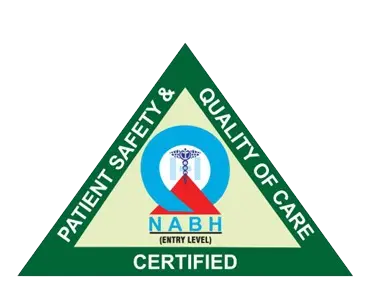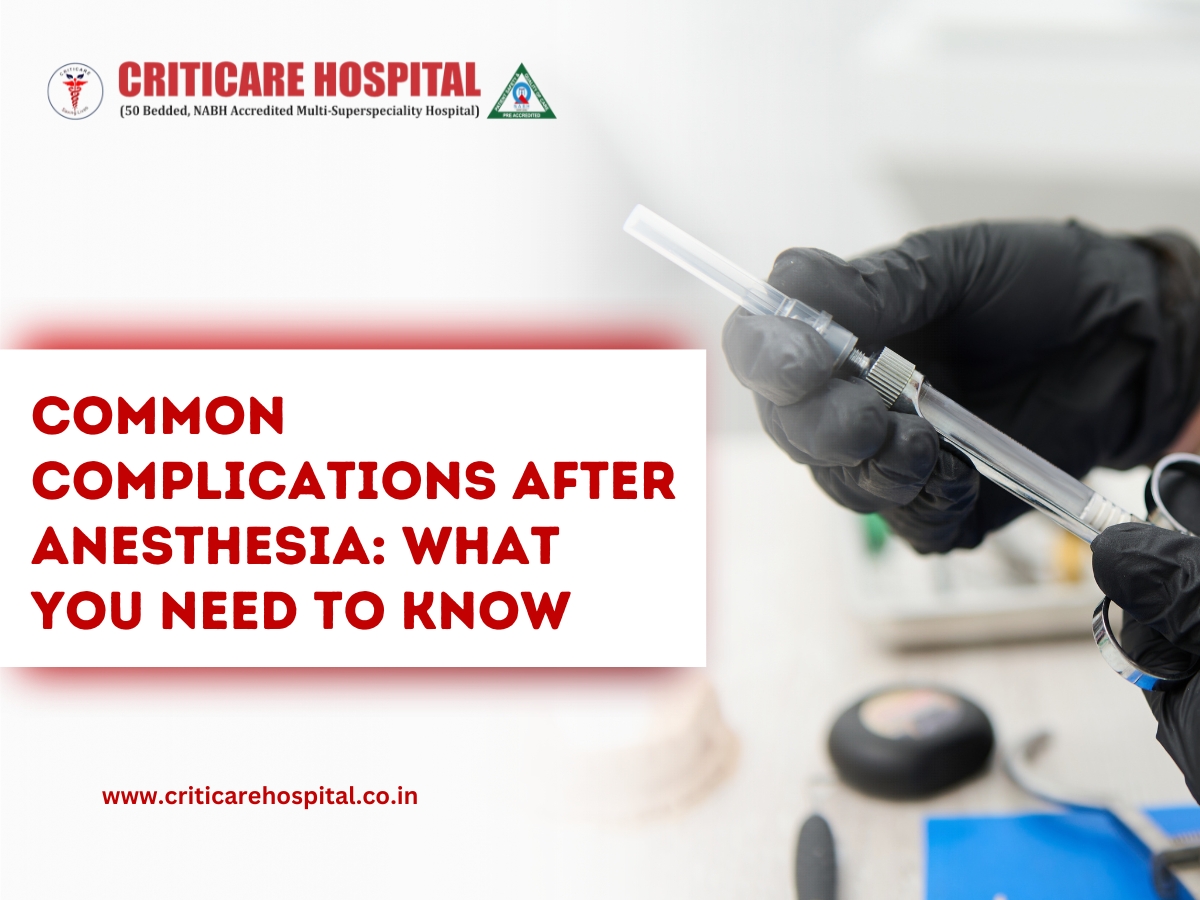Anesthesia is perhaps the most important development in medicine today because it makes the patient feel comfortable and free of pain while he is undergoing major surgery or other intrusive medical procedures. Although it is quite safe, complications following anesthetic administration may occur. In cases of sore throats, which may be healed quite easily, one may next consider the positive effects and complications. Since complications are a dangerous diversion to an expected outcome, it becomes all the more imperative that such complications be recognized by either a medical provider or patient, thereby averting the risk of an unfortunate consequence.
Here, a blog will explain the most common anesthesia-related complications along with their causes, signs and symptoms, treatment, and guidelines for prevention. One would find the blog particularly useful if one is prepared for any sort of procedure, or even if just wanting to know what some of the risks of anesthesia are, as it would allow one to sail through the procedure.
What do you mean by Anesthesia?
It is that branch of medicine in which pain is inhibited during surgery or a medically related procedure. The different forms are given as follows:
- General Anesthesia: The whole experience is being unconscious and unaware of what happens during the whole surgical procedure. It is used during major surgeries.
- Regional Anesthesia: This is when a specific area is blocked, allowing a patient to be conscious. Examples are common during administration of an epidural or spinal block.
- Local Anesthesia: Just numbs a small area of the body, used for minor procedures.
- Sedation: It is usually offered to induce sleep or maintain the patient light asleep during the procedure, along with other anesthesia.
The Importance of Understanding Anesthesia Complications.
Anesthesia is very safe generally, but there are a few complications that can occur, and they are of different origins: often depends on the type of anesthesia, medical history of the patient, skills of the anesthesiologist, and basically, how the drugs are used in the body. Understanding the risks can also help in making the right decisions regarding health care, as well as having health care providers help in managing the risks to the best of their abilities.
Common complications Faced After Anesthesia:
Below are mentioned the common complications that are faced by the patient along with the cause behind the complications, followed by the management that can be useful for the people facing difficulty:
- Nausea and vomiting post surgery:
Nausea and vomiting are the most commonly encountered complications in general anesthesia or sedation. This can last from a few hours to even days after the operation, thus giving the name “postoperative nausea and vomiting,” abbreviated as PONV. It comprises about 30% of anesthesia effects on patients, with differences in predispositions among different individuals. For instance, there can be a patient predisposed to these symptoms like age, sex (higher frequency in women than in men), and previous history of motion sickness or nausea with anesthesia.
Causes:
Certain medications introduced during anesthesia use may disturb the function of the gastrointestinal tract. Hormonal imbalances, such as serotonin and dopamine, may also result in some extra currents of nausea.
Management:
Antiemetic drugs may be given before, during, and after surgery for prophylaxis or treatment of symptoms of nausea. Symptom alleviation can also be achieved by continuing intake of small portions of bland food and plenty of water.
- Sore Throat:
Common and mostly of short duration, a sore throat comes about after general anesthesia, more specifically due to irritation or a discomforting sensation felt in the mucosal lining of the throat resulting from the placement of the endotracheal tube for airway access during surgery.
Cause:
The tube may have scraped the lining of the throat when placed into the mouth for administration of general anesthesia, creating an irritant.
Management:
Sore throats usually resolve over a few days. Throat lozenges or warm saltwater gargles, along with pain medications, may provide some comfort. In rare and severe cases, the doctor may prescribe something for pain that is taken by mouth.
- Drowsiness and fatigue:
Drowsiness or fatigue is another common hassle that comes after anesthesia. The medications that are used to induce and maintain the anesthesia have an effect on the central nervous system and produce a state of grogginess in some patients, whereas others may find it hard to wake up immediately after the procedure. This impairment may last, in general, from a few hours to several days.
Causes:
The anesthetic drugs depress the nervous system, partly responsible for the state of alertness and energy. The metabolism and elimination of these drugs from the system take time.
Management:
Rest is highly required for recuperation. After operations under anesthesia, heavy work and driving vehicles should be discouraged for at least 24 hours. Healthy diets combined with taking sufficient fluids within this period help boost their power.
- Disorientation and Memory Problems
Post-surgical confusion or postoperative delirium is commonly seen in aged postoperative patients. Many people also experience difficulty concentrating, disorientation, and sometimes even memory lapses as a result of anesthesia. Most of these conditions are temporary but may become serious in elderly patients and other beings who have earlier been diagnosed with cognitive disorders like dementia.
Causes:
The cognitive ability in older patients is quite transiently affected by the drugs of anesthesia.
Dehydration, pain, and environmental factors may also contribute to postoperative confusion.
Management:
With the proper hydration and a soothing and familiar environment, we can try to keep the patient away from confusion. When severe, therapeutic intervention might require medications and cognitive therapies to relieve the symptoms.
- Hypothermia
Hypothermia, or the abnormal temperature, is another anesthesia-related problem. Generally, patients remain cool as they are during surgery, as agents influence their effect based on temperature control in the body during the time of anesthesia.. As a result, the condition may bring the body temperature down so low that surgery is extended over a long period.
Causes:
It is because the anesthesia will lower the ability of the body to maintain temperature, exposing the patient to the outer cold. The surgical procedure takes place in cool environments, thereby worsening the matter.
Management:
During surgery, some warming appliances will be applied by the surgical team to maintain temperature within the bodies of patients, like heated blankets or forced-air warming systems. Such monitoring should be done in the postoperative treatment of patients to ensure that body temperature has been properly regulated during the surgery.
- Breathing Problems
Respiratory problems such as inhalation and airway obstruction occur after anesthesia administration. The risk of developing respiratory problems is considerably increased for those who have a prior lung condition, especially those with asthma or sleep disorders, because they are more likely to suffer a respiratory condition.
Causes:
- Anesthesia usually depresses respiratory system function and does not assist in the rapid clearance of secretions from the respiratory structures.
- The trachea or lung may swell or be irritated, causing impairment in breathing.
- Increased risks regarding breathing problems come from prior respiratory illnesses such as asthma or obstructive sleep apnea.
Management:
- Supplements of oxygen may be given to relieve breathing events.
- Close supervision inside the recovery room will provide early intervention when difficulties arise.
- Allergy
Some very rare cases have been reported where individuals are allergic to anesthetic drugs. Symptoms can range from mild pruritic spots to serious problems such as swelling, rash, and anaphylaxis, perhaps the most serious allergy demanding immediate medical help and treatment.
Cause:
Some patients might indeed become hypersensitive to some anesthetic agents or to other drugs used during the time of surgery. Some kind of hypersensitivity might cause anaphylactic reactions toward any agent of the anesthetic drugs.
Management:
Anesthesia usually depresses the function of the respiratory system and fails to drain the secretions rapidly from the respiratory structures. The trachea or lung may swell or develop some kind of irritation that causes impairment in breathing. Most serious breathing problems come from prior respiratory illnesses, like asthma or obstructive sleep apnea.
- Long-Lasting Effects (Postoperative Cognitive Dysfunction)
Very rare cases of postoperative cognitive dysfunction (POCD) generally affecting the older age groups may occur in a reduced span after surgery, up to several weeks and perhaps months after the surgery, hugely affecting memory, attention, and concentration.
Causes:
Age and previous medical conditions increase the patients’ susceptibility to POCD.
Neurocognitive deterioration may be hastened due to stressors in sound form—anesthesia and surgery.
Management:
Cognitive therapy and rehabilitation might play a significant role in the management and treatment of symptoms.
Recovery after surgery includes having mental stimulation, which can encourage a quick recovery effect.
Prevention of Complications from Anesthesia
Most complications following the use of anesthesia cannot be completely avoided. However, there are some ways patients can minimize the risks associated with the anesthesia procedure:
- Thorough Preoperative Assessment: A thorough assessment of the medical history, allergies, and currently used medications of the patient must be done. This reduces the likelihood of complications because the anesthesia plan can be molded to prevent complications that might arise later.
- Patient Education: Education of the patient on possible adverse events from anesthesia and expected behaviors before, during, and after surgery are significant in the risk reduction efforts.
- Surveillance during recovery will identify and treat any problems, such as difficulty breathing or changes in heart rate, on time.
- Patients with any preexisting medical condition, especially any lung or heart problems, should discuss those with their cardiologist to ensure a safe procedure.
Conclusion
Anesthesia-related complications are rare but when they do exist, their spectrum is exceptional. In such instances, the patient and professionals must, together, act in the best interest of the achievement of the most desired outcome. This dissemination of the probable complications of anesthesia will effectively boost the confidence of the patient regarding the anesthesia in question and will make early risk planning possible for the provider. Should any complications arise, whether nausea, a sore throat, or more challenging issues such as difficulty breathing, knowledge acts as a valid tool for decision-making through the recovery journey. Be informed. Be safe. Trust your health care team to guide you through the entire process.



